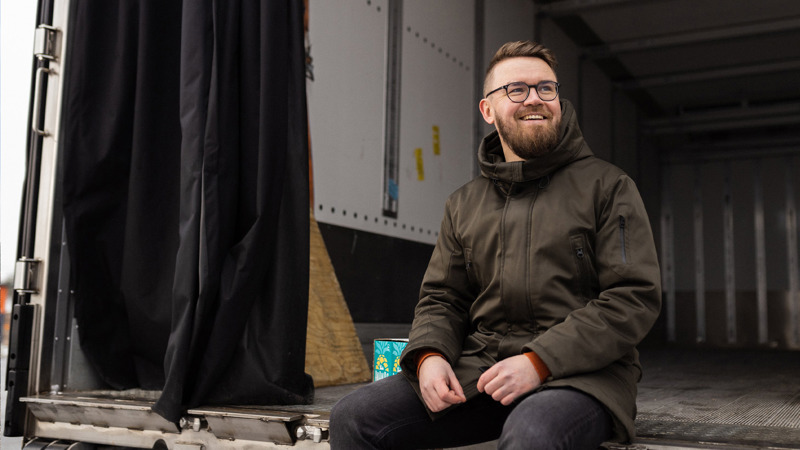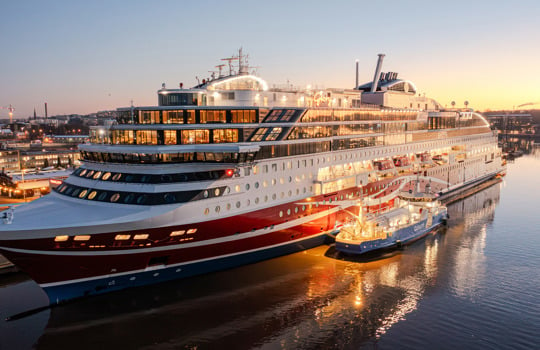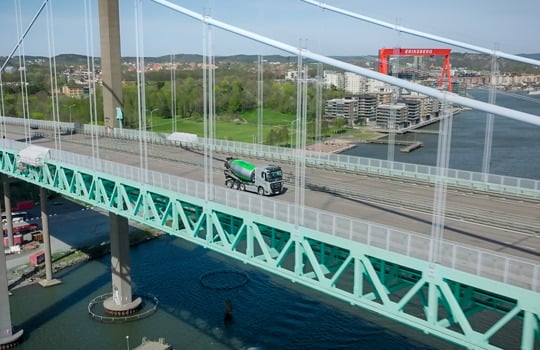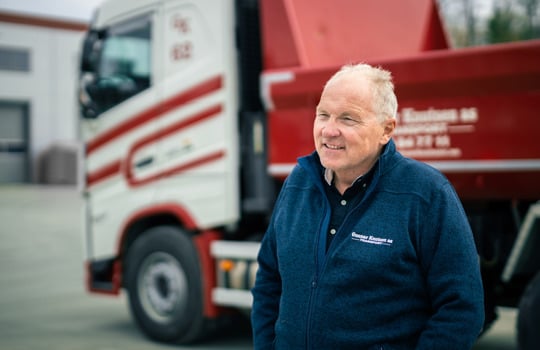Orkla chocolate and chips go by low-emission biogas
Moderate costs and low emissions are encouraging companies to use biogas in transport. These days, Orkla’s delicacies also go by gas.
Many companies are constantly thinking of new ways to make their operations more environmentally friendly. Orkla, a Nordic leading brand consumer goods company, has invested in transports using renewable biogas from Gasum.
Around a thousand products bearing the Orkla name can be spotted in grocery stores. In Finland, Orkla has production sites in Vaajakoski, where Panda confectionery is made, and in the Åland Islands, where Taffel chips and Oolannin frozen potato products are made.
Mauri Suuronen, Planning and Logistics Manager at Orkla, commends the great smoothness of transports using biogas.
“It was an easy decision to make since our logistics partner was enthusiastically involved. We have a responsibility to act as a leader in our industry and to enable more responsible consumption.”
Since 2014, Orkla Group has reduced greenhouse gas emissions in its own operations by 65%. Renewable energy sources account for 47% of the energy used.
Orkla is one of the first companies worldwide to have its target of net-zero greenhouse gas emissions across the value chain by 2045 approved by the Science Based Targets initiative.
Suuronen says that transports using biogas are an important part of Orkla’s work with responsibility. Optimizing the fleet used and the load factor does make a difference.
“Since we move goods in large volumes, even minor changes can have an impact.”
Finnish delicacies responsibly
Responsibility plays a key role in production at Panda. No palm oil is used in the production of Panda confectionery and the cocoa and hazelnuts are Rainforest Alliance certified. The food waste at the Vaajakoski site is put to good use.
July saw another new step for the better. Around 60 pallets of confectionery travel daily between Vaajakoski and Tuusula by biogas.
Gas-powered trucks transport all the familiar Finnish classics such as Panda licorice and Juhlapöytä assorted chocolates, which, with Christmas just around the corner, will soon again be found in almost every household.
Suuronen hopes that consumers also consider low emissions to be an important aspect in getting the products to the store shelves.
“Production for the Christmas season starts as early as in April-May. More than three million boxes of Juhlapöytä chocolates are sold in Finland each year,” Suuronen says.
An amazing 99% of the waste at Vaajakoski is recovered and consumers, too, can contribute to this. The factory outlet sells confectionery that is defective in appearance, but otherwise unblemished, at a reduced price. Grocery stores, too, also sell “Panda does good” bags of defective candies.

Photo: Mauri Suuronen at Orkla says that consumers are also interested in the environmental impacts of products.
Biogas reduces emissions by as much as 90 percent
Storemen Logistics, Orkla’s logistics partner, first started to use a gas-powered truck more than two years ago and now has eight of them.
“Environmental awareness has increased over the years. We concluded that we also needed to do something to lower our own carbon footprint,” says Storemen Logistics’ managing director Jari Jokinen.
Established in 2005, Storemen Logistics is nowadays carbon neutral. Jokinen says that all emissions have been offset since the beginning of 2022 through planting forests in areas being taken out of peat production use in Finland. On top of this, the group has the 13th largest solar power plant in Finland.
“Many companies talk about environmental friendliness, but it also requires action. We want to show an example by making ecological choices and leaving a cleaner world to future generations.”
Jokinen says that the gas-powered vehicles have performed well as regards driving, refueling and servicing. There’s no difference in performance compared to diesel vehicles.
“We use Gasum’s locally produced, fully renewable biogas. This means a reduction in emissions of as much as 90 per cent compared to fossil fuels.”
Gasum produces biogas at 17 biogas plants in Finland and Sweden. Organic materials such as biowaste, wastewater, manure and industrial by-products are used as a biogas feedstock.

Photo: entrepreneur Ari Peltola at Kuljetusliike Ari Peltola Oy believes that the use of gas-powered vehicles will increase going forward.
Gas filling station network expanding
Kuljetusliike Ari Peltola Oy and Orkla held contractual negotiations, the outcome of which was a decision to acquire an ecological gas-powered truck. Delivery of the truck was delayed due to the global shortage of components, but the company started transport with the vehicle in July.
“Our aim has been to keep our fleet up to date and to use the latest technology. Loads of Orkla chocolate and chips are well suited to gas-powered deliveries,” Ari Peltola says.
The logistics entrepreneur believes that the use of gas-powered vehicles will become more common in hauling light deliveries. A major factor in this trend has been the expansion of Gasum's gas filling station network.
“Three gas filling stations between Jyväskylä and Helsinki ensure smooth transports. Trucks can drive as far as 1,200 kilometers on a full tank.”
Apart from the use of protective equipment, there is no difference between filling up with liquefied biogas and refueling with diesel. The greatest advantage is in environmental impacts: besides reduced greenhouse gas emissions, there are fewer local emissions affecting human health.
Loads moving with virtually no carbon dioxide emissions have also contributed to the competitiveness of the logistics company, which has been in operation for 30 years.
“Now everyone wants gas-powered vehicles. Firms, too, have woken up to the environmental debate that is bubbling under,” says Peltola.
Is your business seeking a way to a cleaner future?
Contact us and we'll tell you more about the possibilities in gas logistics.



